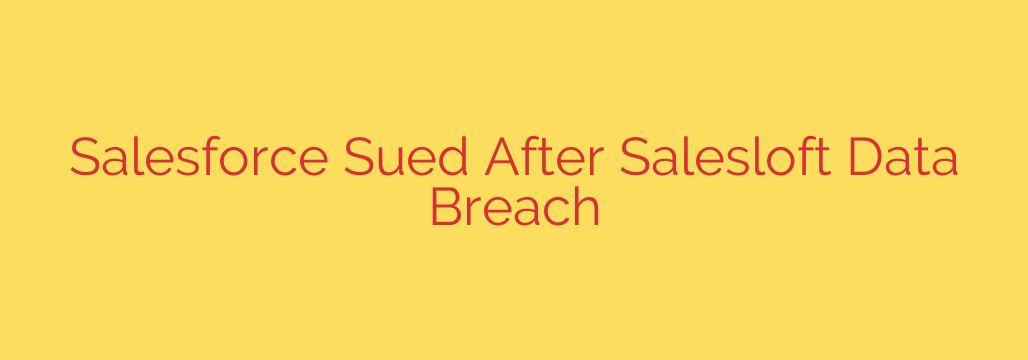
Salesforce Faces Class-Action Lawsuit Over Major Salesloft Data Breach
Salesforce, a titan in the CRM industry, is now facing a significant legal challenge following a massive data breach at its recently acquired company, Salesloft. A class-action lawsuit has been filed, alleging that the company failed to adequately protect the sensitive personal and business information of its users, leading to widespread exposure.
This incident underscores the complex cybersecurity risks associated with corporate acquisitions and highlights the critical responsibility companies have to safeguard user data.
What Happened? The Salesloft Security Incident
The lawsuit stems from a security breach that occurred at Salesloft, a popular sales engagement platform that Salesforce acquired. According to the complaint, cybercriminals gained unauthorized access to Salesloft’s systems, compromising a vast amount of user data.
The exposed information reportedly includes a mixture of both business contact details and sensitive personally identifiable information (PII). This combination is particularly concerning, as it can be used by malicious actors for sophisticated phishing campaigns, identity theft, and corporate espionage. The breach didn’t just affect direct Salesloft users; it also impacted individuals whose data was stored within the platform by Salesloft’s clients.
The Core Allegations Against Salesforce
The class-action lawsuit claims that Salesforce and Salesloft were negligent in their duty to protect user data. The plaintiffs argue that the companies are legally responsible for the breach due to several key failures.
Key allegations raised in the lawsuit include:
- Failure to Implement Reasonable Security: The suit alleges that the companies did not maintain adequate data security measures to defend against a foreseeable cyberattack. This includes failing to properly secure and encrypt sensitive user information.
- Inadequate and Untimely Notification: A central point of the complaint is the claim that victims were not notified of the breach in a timely or sufficient manner. This delay allegedly prevented individuals from taking immediate steps to protect themselves from potential fraud and identity theft.
- Negligence and Breach of Contract: The lawsuit asserts that by failing to secure user data, the companies were negligent and breached the implied contracts they had with their users to keep their information safe.
This legal action seeks to hold the company accountable for the breach and to secure compensation for the affected individuals whose data is now potentially in the hands of cybercriminals.
A Stark Reminder of Third-Party and Acquisition Risk
This incident serves as a powerful reminder of the inherent risks involved in mergers and acquisitions. When one company acquires another, it doesn’t just inherit its assets and technology—it also inherits its cybersecurity vulnerabilities.
Thorough due diligence during an acquisition process must include a comprehensive audit of the target company’s security infrastructure, policies, and past incidents. Failure to do so can lead to significant financial, reputational, and legal consequences, as the Salesforce-Salesloft case demonstrates. For any business, this highlights the critical importance of vetting the security practices of all third-party vendors with access to your data ecosystem.
Actionable Steps to Protect Your Data
While you may not have been directly impacted by this specific breach, it’s a crucial opportunity to review your own security posture. Data breaches are becoming increasingly common, and proactive measures are the best defense.
- Be Vigilant Against Phishing Attacks: Cybercriminals often use stolen data to craft highly convincing phishing emails. Be suspicious of any unsolicited messages asking for login credentials, financial details, or other sensitive information, even if they appear to come from a known contact.
- Update Your Credentials: If you have an account with Salesloft or any related service, change your password immediately. Avoid reusing passwords across different platforms to limit the impact of any single breach.
- Enable Multi-Factor Authentication (MFA): MFA is one of the most effective tools for securing your accounts. It adds an extra layer of protection beyond just a password, requiring a second form of verification (like a code from your phone) to log in.
- Monitor Your Accounts: Keep a close watch on your financial statements and credit reports for any unusual activity. Early detection is key to minimizing the damage from potential identity theft.
Ultimately, the lawsuit against Salesforce is more than just a legal battle; it’s a critical signal to the entire tech industry about the non-negotiable importance of data security and corporate responsibility in an interconnected world.
Source: https://go.theregister.com/feed/www.theregister.com/2025/09/26/salesforce_class_actions/








